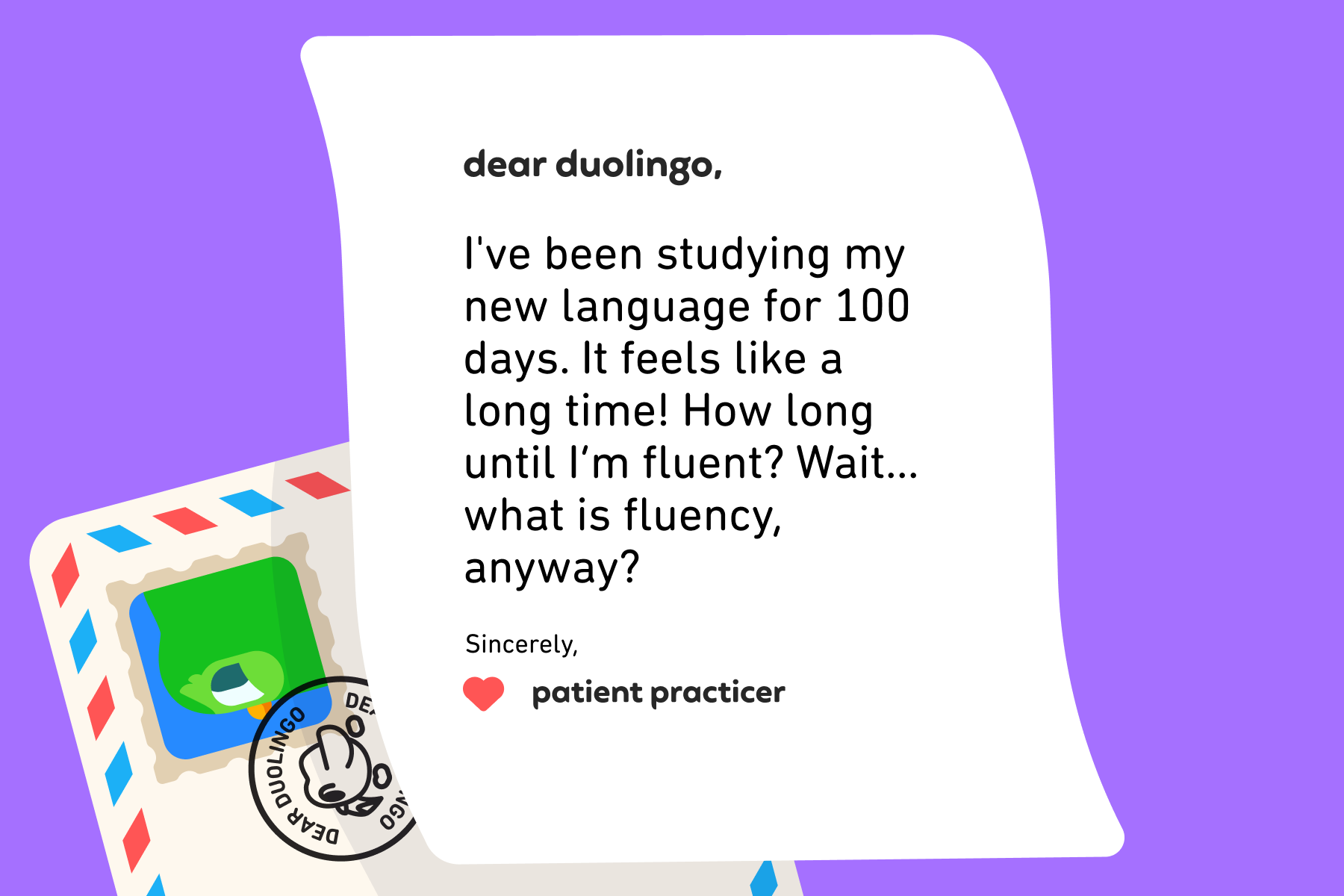A lot of questions pop up when you’re learning a language. Sure, you might find yourself thinking, “Okay, what’s the word for that, again?” but as you spend more time learning, you also might want to go a bit deeper. Why does my new language have these tricky grammar rules? Why do languages use different sounds for similar looking letters? How did some languages develop entirely new alphabets?
Though we don’t have all the answers, we have some of them! Welcome to the first installment of Dear Duolingo, an advice column just for language learners! Here, Duolingo experts will answer all your questions about language, learning, and linguistics so you can feel confident in what you’re learning, how to study, and why it matters!
Okay, so your first question might be, who’s answering my questions? Is it the owl? Not quite!
My name is Dr. Cindy Blanco, and I’m a senior learning scientist at Duolingo—that means that I work on applying language and learning research to the teaching tools we develop for our courses. I have a master’s degree in Spanish linguistics and a PhD in linguistics, and my research focused on differences between how kids and adults learn languages and how you learn to tune your ear (and your tongue!) to the sounds of your new language. I’ve taught Spanish, linguistics, cognitive science, and even statistics!
I think about language a lot—like, all the time. (Ask my mom; she’s been dealing with this obsession of mine for decades.) Language is everywhere, and it touches our life in so many ways: through music, art, social media, TikTok comments, and texting; how we communicate and connect with people in the same room and people across the globe; when we tell jokes or feel good, hurt, or confused. Language matters, and language matters to you, dear learners!
Let’s kick things off with today’s topic:

This is such a great question because it hits on what it means to “know” a language, what kinds of goals learners should set for themselves, and how you can measure your progress when learning a new language.
When most people say they are “fluent” in a language, or that they want to be “fluent,” they probably mean something more like “comfortable.” But “fluent” gives the impression of being as proficient in the new language as you are in the language you grew up using, which is something many bilinguals achieve—but I would say it’s not a helpful or even necessary goal for most learners. There are some myths around fluency and its importance. Have you ever heard these myths, or even thought them to yourself maybe? 😬
- I need to be fluent in order to be understood.
- I need to be fluent in order to feel comfortable speaking.
- I need to be fluent in order to understand everything around me.
The reality is that there is no end point for learning a language—including your own language!—and you can probably reach many of your language goals (understanding, being understood, feeling comfortable) without having to study for years and years.
How to define “fluency”
Here’s why “fluency” is complicated: “Fluency” is really hard to measure. What does it mean, and how might a teacher or language researcher measure or test it?
If you can say a lot, and say it quickly, but still make a lot of grammatical errors, does that count as “fluent”? What about someone who has excellent grammar, knows all the rules, but it takes them a while to put it all together in sentences? Is that “fluency”? Or what if your grammar is spot-on, but it’s not really the most appropriate or natural way to say things… is that “fluent”? There are so many factors!
And honestly, depending on what you want to do with the language, any one of those scenarios might serve you just fine! If you’re traveling in a new place and are being understood, how important is it if you didn’t use the right preposition? And if you haven’t mastered all the nuance of the language but are still making meaningful connections with family who speak another language, isn’t that actually quite an accomplishment?
Communication is really the most important part of language learning, so if you’re on your way to communicating your needs in the ways you want to express yourself, then you are making good progress.
What makes you “fluent”?
That’s why we language researchers and teachers prefer to think about different components of language learning, so we break language down into smaller parts that we can measure. Here are some of language experts’ favorite components to measure. Where are your strengths and weaknesses?
- Language skills: Speaking, writing, reading, and listening. These “SWRL” skills are meant to capture the different things you do with language, and it’s normal for some to come easier than others, especially at different points in your learning.
- Language knowledge: Vocabulary, grammar, pronunciation, and conversation rules. Within each of these, there are different levels of proficiency, so you might have pretty advanced vocabulary and know a lot of words but have more beginner grammar and don’t know many verb tenses yet. You can even subdivide these areas further, like pronunciation can be separated into knowing and using the individual sounds of the language versus knowing the language’s rhythm and intonation (“prosody”).
You can also measure how much you say, the rate of producing the language—like how easy it is to get the words out, in speaking, writing, or signing, and do you have to pause a lot. And that is separate from the accuracy of what you say and whether all the language’s rules were followed.
Another way to think about proficiency is about how understandable you are to someone who knows the language, and this comprehensibility isn’t the same as knowledge of grammatical rules or perfect pronunciation.
When you break “fluency” down into all the different components of language, you can see why it’s not so easy to define fluency! Knowing how to analyze language like this can help you set specific, meaningful goals and better track your progress.
Work towards language progress instead of fluency
So, Patient Practicer, the answer is: Fluency is a myth and there are lots of more meaningful ways to gauge your progress! It just depends on what your goal is. I think this is one of those questions that is so different for each learner that there isn’t a one-size-fits-all answer.
Thanks for reading the first installment of Dear Duolingo! Do you have a question you want answered? Reach out at dearduolingo@duolingo.com or tag us on social using the hashtag #DearDuolingo. We’ll see you back here every other Tuesday!
